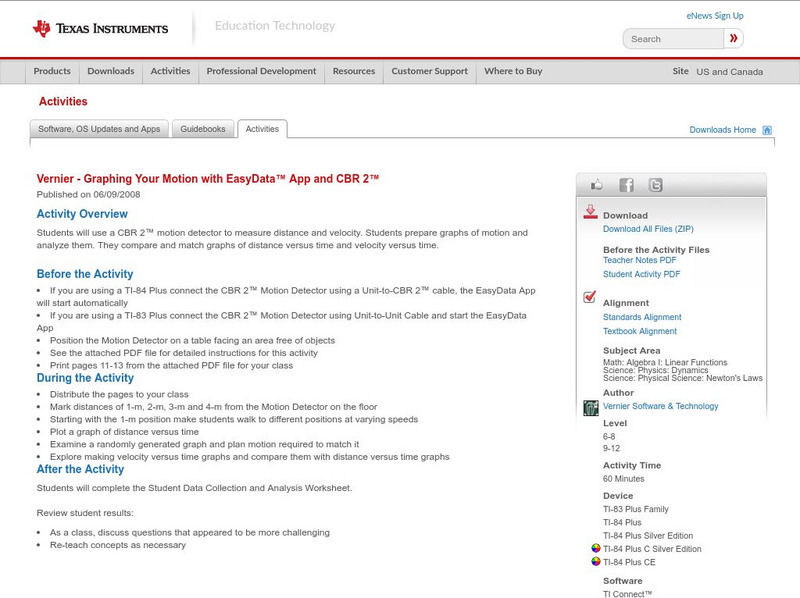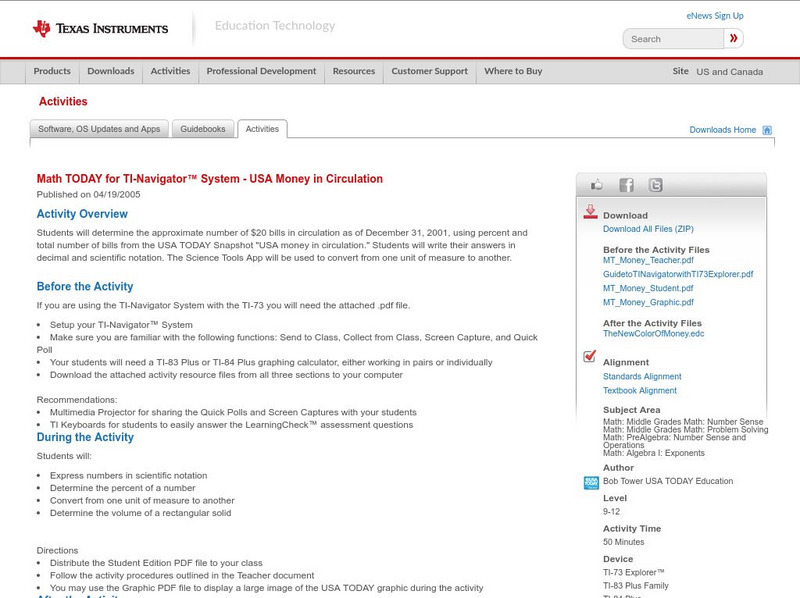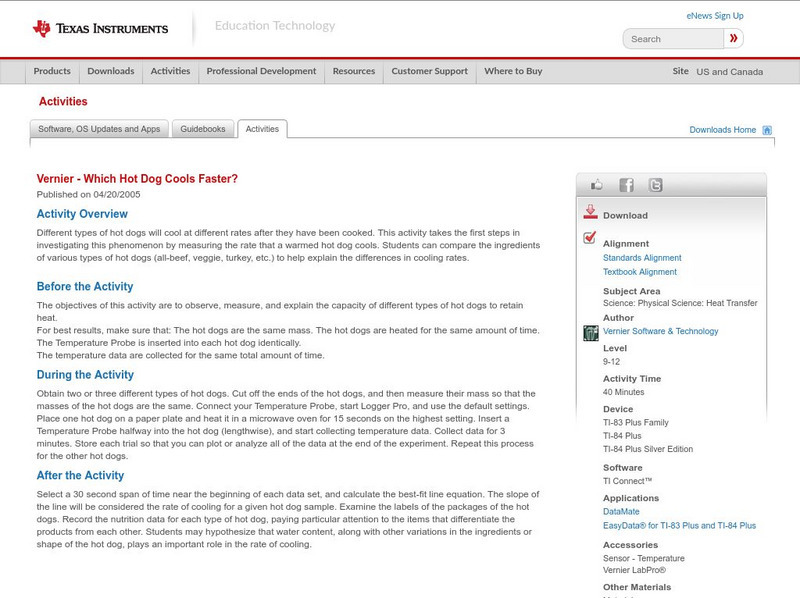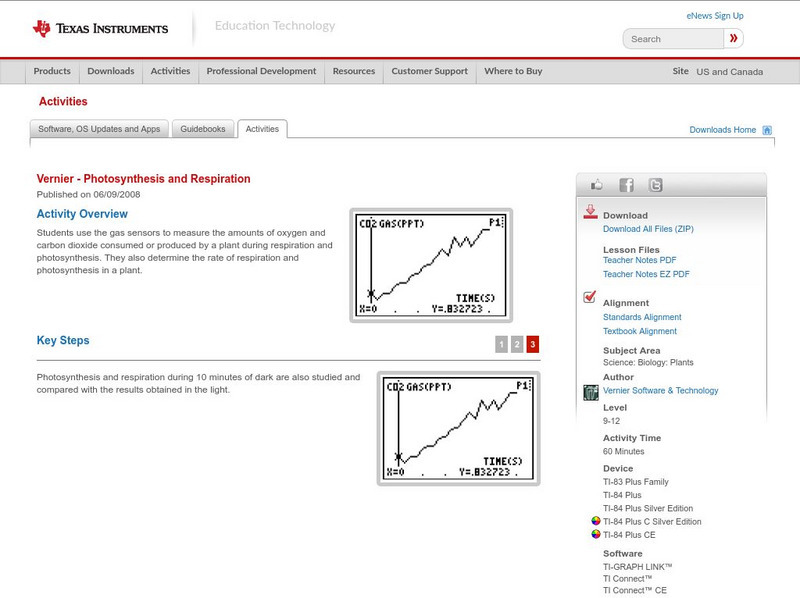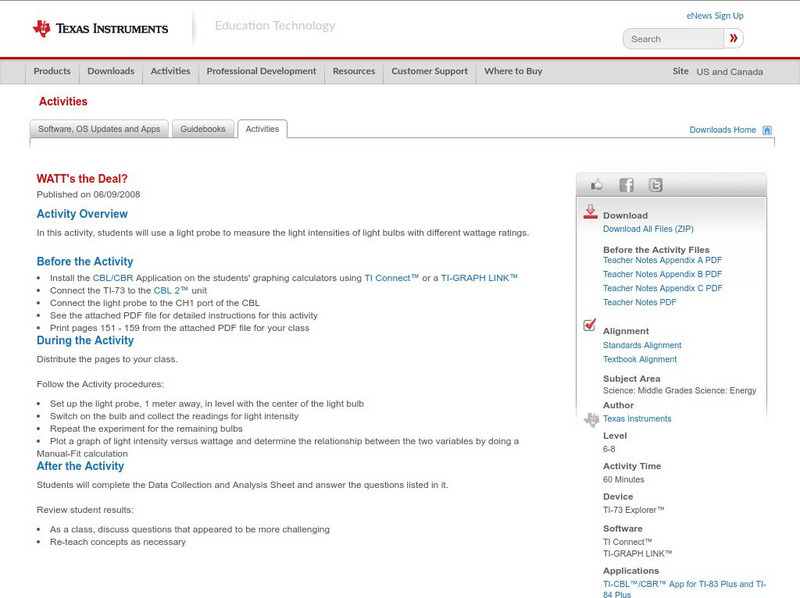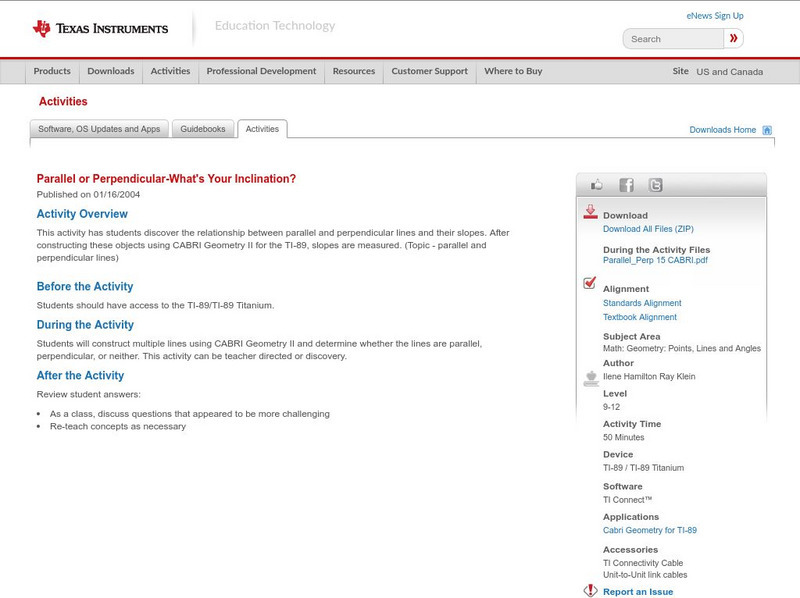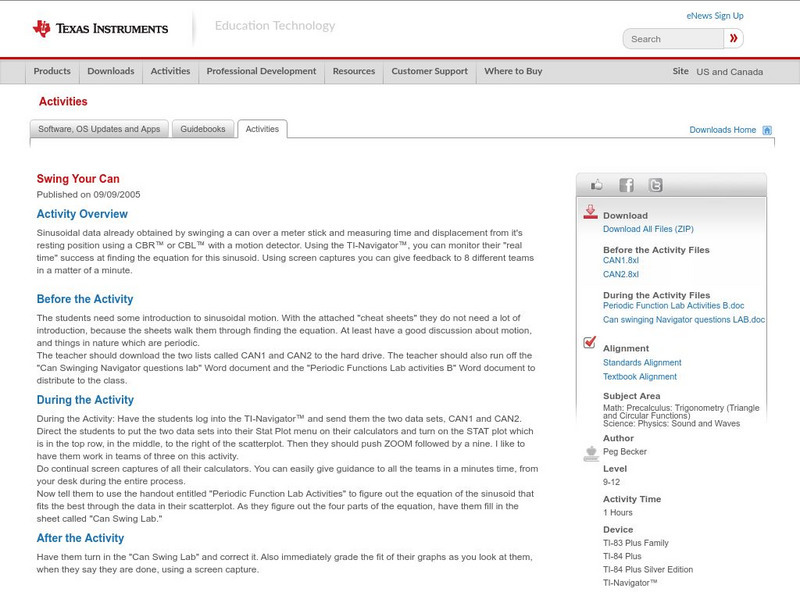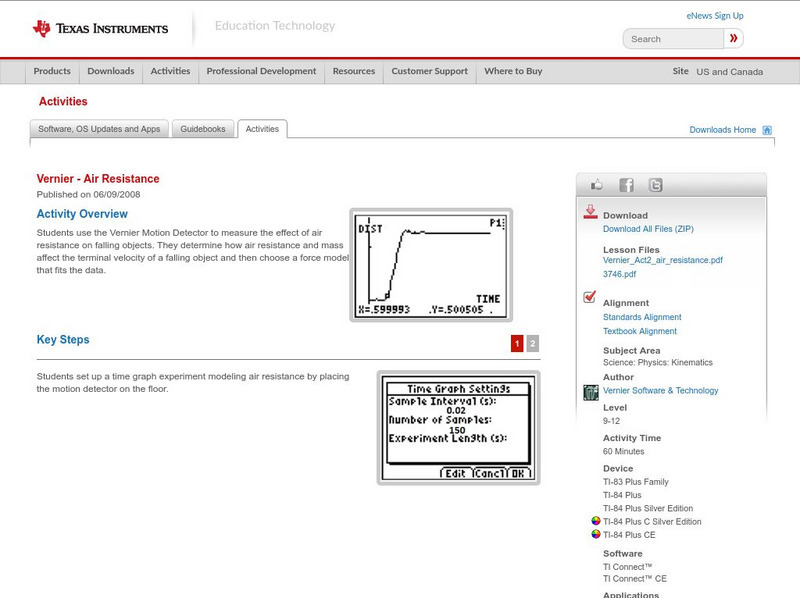Texas Instruments
Texas Instruments: Math Today When a Ruler Isn't Enough
This activity illustrates a real-life problem that uses trigonometry to solve for an unknown. students can use trigonometric ratios and inverse trigonometric relationships to determine the side of a triangle and the measure of the...
Texas Instruments
Texas Instruments: Graphing Your Motion With Easy Data App and Cbr 2
Students can use a CBR 2 motion detector to measure distance and velocity. Students prepare graphs of motion and analyze them. They compare and match graphs of distance versus time and velocity versus time.
Texas Instruments
Texas Instruments: What Goes Up: Position and Time for a Cart on a Ramp
In this activity, students' will use a motion detector to measure how the position of a cart on a ramp changes with time. They will then determine a parabolic model for the position data using the intercepts.
Texas Instruments
Texas Instruments: Math Today for Ti Navigator Usa Money in Circulation
Students will determine the approximate number of $20 bills in circulation as of December 31, 2001, using percent and total number of bills from the USA TODAY Snapshot "USA money in circulation." Students will write their answers in...
Texas Instruments
Texas Instruments: Parallel Lines, Transversals and Angles
This activity allows students to: 1. Identify the pairs of angles formed when a transversal intersects two lines.: 2. Measure angles Using Cabri Jr. 3. Identify relationships between pairs of angles when a transversal intersects parallel...
Texas Instruments
Texas Instruments: Adding Marbles
Each time students add ten marbles to a container filled with a small amount of water, they measure the height of the water. Students will examine their data and develop linear equations.
Texas Instruments
Texas Instruments: Which Hot Dog Cools Faster?
Different types of hot dogs will cool at different rates after they have been cooked. This activity takes the first steps in investigating this phenomenon by measuring the rate that a warmed hot dog cools. Students can compare the...
Texas Instruments
Texas Instruments: Photosynthesis and Respiration
Students use the gas sensors to measure the amounts of oxygen and carbon dioxide consumed or produced by a plant during respiration and photosynthesis. They also determine the rate of respiration and photosynthesis in a plant.
Texas Instruments
Texas Instruments: Triangle Inequality Theorem
In this activity, students will explore the concepts underlying the Triangle Inequality Theorem by comparing side lengths and angle measures of a triangle. They will use an interactive construction to see why this theorem is true.
Texas Instruments
Texas Instruments: Holt Physics: Brightness of Light
This probeware version of the Skills Practice Lab Brightness of Light from the chapter Light and Reflection uses a light probe to measure the intensity of light at different distances from a light source.
Texas Instruments
Texas Instruments: Watt's the Deal?
In this activity, students can use a light probe to measure the light intensities of light bulbs with different wattage ratings.
Texas Instruments
Texas Instruments: P H
Students use a pH sensor to measure the pH level of water in a stream or lake. They examine how air pollutants like sulphur dioxide, nitrogen oxides, and carbon dioxide cause acid rain, which affects the pH of water bodies and aquatic...
Texas Instruments
Texas Instruments: Got Complements? With Cabri Jr.
Use the Axes and Measure Angle tool to explore and calculate complementary angles.
Texas Instruments
Texas Instruments: Jason: Does Clear Water Mean Healthy Water?
JASON Aquatic Field Study: Explore how most aquatic animals and plants need clear water to survive by performing an experiment to measure the water clarity of a local aquatic site.
Texas Instruments
Texas Instruments: Electrolytes: Which Liquid Produces the Most Volts?
In this activity, students' will use a Voltage Sensor to measure the voltage produced by an electrolyte. They will understand that acids and bases are electrolytes and compare voltages of acids to the voltages of bases. Students' will...
Texas Instruments
Texas Instruments: Ratios in Regular Polygons
In this activity, students use linear measurement and calculators to investigate the ratios between corresponding parts of regular polygons.
Texas Instruments
Texas Instruments: Linear Regression: Wing Span/height
Students take measurements of individual's wing span and height and create a coordinate graph. The activity should include at least three different grade levels. Students submit an equation through "Activity Center" and the class...
Texas Instruments
Texas Instruments: Conductimetric Titration & Gravimetric Determination
Students use a Conductivity Probe to measure change in conductivity during a chemical reaction and determine the equivalence point of the reaction They determine the mass of the product and calculate the molar concentration of the...
Texas Instruments
Texas Instruments: Parallel or Perpendicular What's Your Inclination?
This activity has students discover the relationship between parallel and perpendicular lines and their slopes. After constructing these objects using CABRI Geometry II for the TI-89, slopes are measured. [Requires Adobe Reader.]
Texas Instruments
Texas Instruments: Swing Your Can
Sinusoidal data already obtained by swinging a can over a meter stick and measuring time and displacement from its resting position using a CBR or CBL with a motion detector. Using the TI-Navigator, you can monitor their "real time"...
Texas Instruments
Texas Instruments: Air Resistance
Students use the Motion Detector to measure the effect of air resistance on falling objects. They determine how air resistance and mass affect the terminal velocity of a falling object and then choose a force model that fits the data.
Texas Instruments
Texas Instruments: Golden Rectangles
In this activity, students measure rectangles and calculate ratio between the sides. They compare the ratio to the Golden Ratio.
Texas Instruments
Texas Instruments: Lemon "Juice"
"Juice" is a slang term sometimes used for electricity. Batteries are made up of one or more cells. Cells often consist of two different materials in a solution that are connected to each other by a wire. In this experiment, you will...
Texas Instruments
Texas Instruments: Points on the Perpendicular Bisector of a Segment
In this activity, students use the drawing and measurement tools of Cabri Jr., to learn and understand the concept of "equidistant from the endpoints of a segment." They observe the changes if they move a point on the perpendicular...



